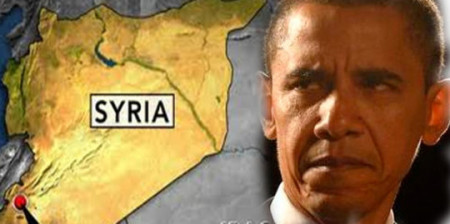Unresolved questions are flying over Russia’s proposal that Syria to give up chemical weapons stocks, in exchange for the US lifting its threat of airstrikes. Did Moscow seize upon a blunder by US Secretary of State John Kerry on Monday morning to make the proposal? Or did Russia and the Obama Administration work behind the scenes to come to an acceptable compromise?
In either case, the immediate outcome is that the Russians have gotten President Obama off the political hook.
Twenty-four hours ago, Obama was facing domestic and international humiliation, piled upon his indecision and mis-steps since the Assad regime’s August 21 chemical weapons attacks.
In the week following the attacks, the US President fumbled over whether the US would carry out a “limited” military response to the mass killing. Then on August 30, when US Secretary of State John Kerry finally put Washington on the verge of action with a tough speech, Obama abruptly changed course. The President believed a strike was necessary, but rather than taking the decision himself, he would put the issue to Congress.
For the sake of his domestic position, Obama had given the Assad regime a window of at least two weeks to resume a mass offensive against insurgent positions. But even the move on the home front was on the verge of backfiring last weekend: polling of Congressional representatives indicated there would be an embarrassing rejection of Obama’s proposal for limited intervention.
Other developments had hindered Obama. The British Parliament’s rejection of immediate action undermined a “coalition” for the airstrikes, and the President’s military has waged an internal but well-publicized battle against any intervention.
Still, the headline after Congress’s verdict looked set to be that the Commander-in-Chief had failed to Command.
And then on Monday, Russia offered salvation — whether as part of a smart, back-channel plan with the Americans or as an opportunistic gambit.
Moscow’s seizure of the political high ground, offering “peace” through Syria’s relinquishing of chemical weapons and the deferral of US airstrikes, meant that Obama could step back from the Congressional cliff. As the President told national television on Monday night that he supported the Russian plan in principle, the Senate postponed its vote, set for Wednesday. That in turn delays a decision by the House of Representatives, the more likely of the two chambers to reject intervention.
Of course, none of this — so far — offers a practical answer as to how Syria’s chemical weapons will be secured and handed over. Such a process is likely to take many weeks, and it can only be achieved if there is a cease-fire on the ground, a far-from-likely prospect.
And none of this really offers “peace”, assuming that a cease-fire is not declared. Assad’s military will capitalize by continuing its current offensive to re-claim the Damascus suburbs and territory in the north, opening the road to Aleppo. Syrian warplanes and artillery will continue to bombard insurgent-held towns and villages. The insurgency will look for more victories in the south and consolidation of their position across most of northern and eastern Syria.
And none of this will do anything to resurrect the hundreds of people — the “children who were gassed”, in the words repeated often by Obama — who died on August 21.
But, politically, all of this is beside the point on this Tuesday. A weak President has been pulled back from the political abyss — thanks to the Russians who supposedly were one of his greatest diplomatic foes.

